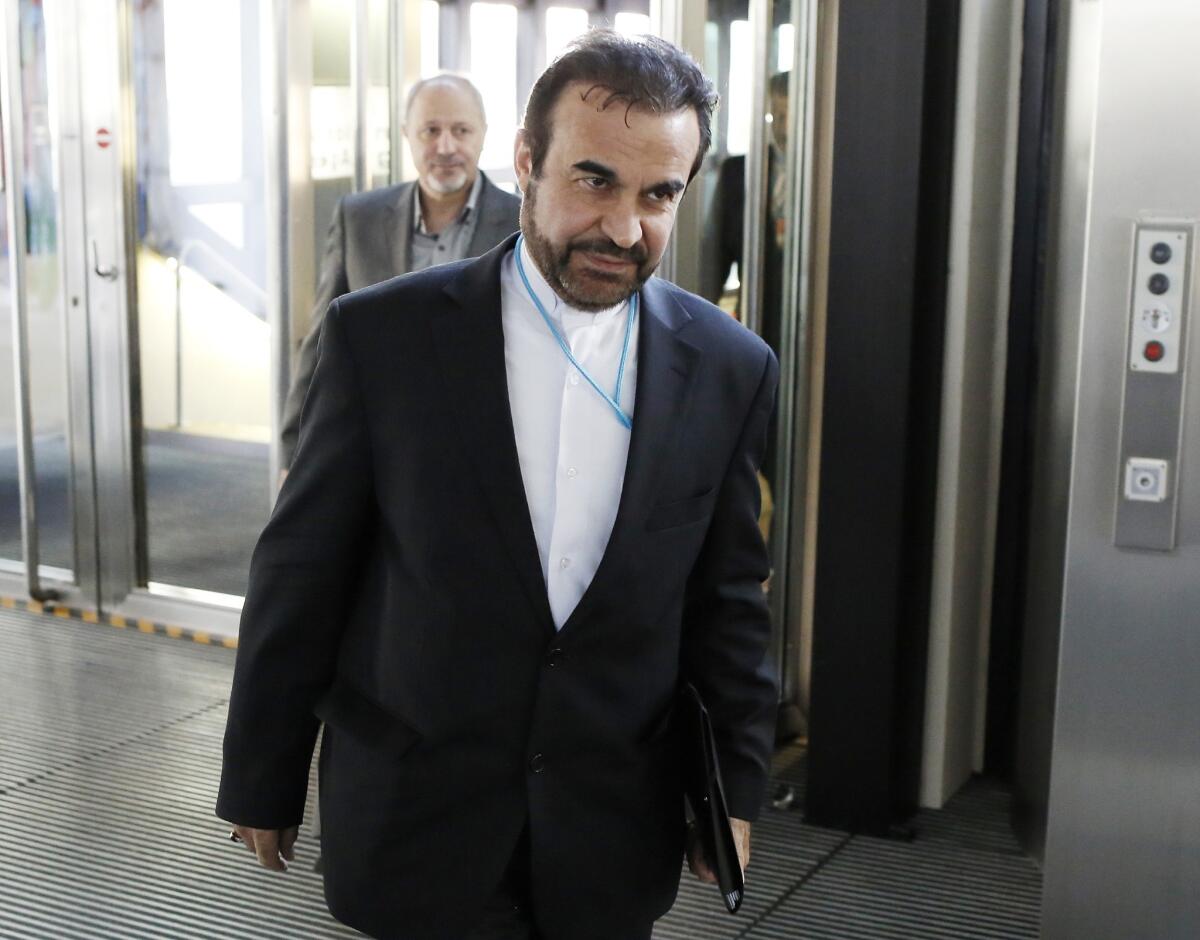Analysis: U.S., Iranian leaders need success, but see peril in nuclear talks

Iran’s ambassador to the International Atomic Energy Agency, Reza Najafi, arrives at United Nations offices in Vienna for a new round of talks.
- Share via
Reporting from Vienna — The negotiations over Iran’s nuclear program that resume here this week could, if successful, give a huge boost to the governments in Washington and Tehran. But if they collapse, there could be damaging political blowback for leaders in the two capitals.
That’s why President Obama and Iran’s supreme leader, Ayatollah Ali Khamenei, even while publicly supporting the talks, have each tried to shield themselves from the potential fallout from the failure of their most important diplomatic initiative.
Khamenei, while authorizing President Hassan Rouhani to seek a deal, has also distanced himself from the effort by laying out tough demands and making clear to the public that it’s up to his subordinate to try to get a good deal. Obama, meanwhile, has talked down the odds of a successful negotiation, and said he’s preparing to move on to alternative approaches for limiting Iran’s controversial nuclear program if the Tehran regime and six major world powers cannot negotiate a solution.
“Khamenei is in some ways acting like Obama on this,” said Jofi Joseph, a White House advisor on nonproliferation until last fall. Both men, he said, are “trying to protect themselves politically.”
Negotiators for Iran and the six world powers are beginning a two-month sprint to their goal of finishing a deal by July 20 that would lift tough international economic sanctions on Iran in exchange for safeguards to prevent Tehran from acquiring the capability to make a nuclear bomb.
The gathering begins Tuesday evening with a dinner between Iranian Foreign Minister Mohammad Javad Zarif and European Union foreign policy chief Catherine Ashton. Joint meetings of negotiators from the seven countries are to begin Wednesday and are expected to run through Friday.
Khamenei desperately needs a deal to ease the sanctions pressure on an economy that is already in deep trouble because of mismanagement and international isolation. Popular discontent with the economy could become a threat to the regime.
Yet Khamenei doesn’t want to be seen as the revolutionary leader who has yielded to the West on the $100-billion nuclear program that is a source of pride for ordinary Iranians.
He’s positioned himself carefully, so that if the talks collapse, or yield terms that Iranians consider humiliating, “he can wash his hands of the whole thing,” Joseph said. “He’s positioned to succeed, no matter what.”
Obama has made clear how important the Iran talks are to him: It was No. 1 on his list of international security goals in his speech to the United Nations General Assembly last September. Obama needs a foreign policy win at a time when his Israeli-Palestinian peace initiative appears to have collapsed and he faces criticism for his administration’s approaches to the Syrian civil war and Russia’s threat to Ukraine.
But he doesn’t want Iran to think he’s desperate.
And he does not want his critics to say he was naive to seek a deal, as some in Congress and Israel are saying about his second failed peace foray. So Obama has been notably downbeat on the talks, even more so than some subordinates.
A senior U.S. official at the talks last month voiced optimism about getting a deal by July, saying that the Iranians have shown in meetings since a preliminary deal was struck last November that they were serious about an agreement. But aides say Obama still believes that the chances of success are 50% or less.
Although both sides have made clear they are eager for a satisfactory agreement, they remain far apart on how much uranium enrichment capability Iran can retain. They also have major differences on how quickly and completely sanctions could be lifted; on how intrusively Iran’s nuclear facilities would be monitored; and on how many years the deal would limit Iran’s nuclear activities.
Negotiators from the six countries -- Britain, France, Germany, the United States, Russia and China -- are expected to begin actually drafting language for the agreement at this week’s meetings. Analysts expect them to start with noncontroversial subjects, while setting aside disputed areas until the end.
More to Read
Sign up for Essential California
The most important California stories and recommendations in your inbox every morning.
You may occasionally receive promotional content from the Los Angeles Times.














